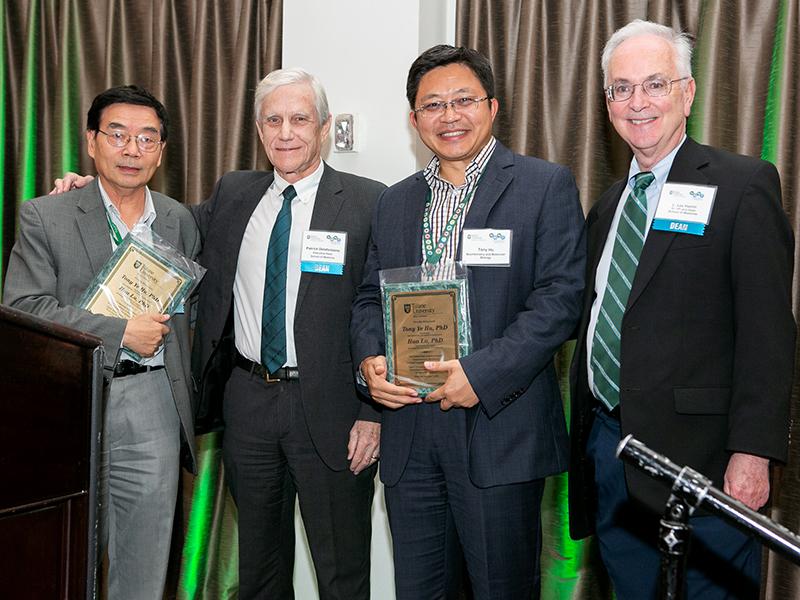Annual Faculty Synergy Research Event celebrates collaboration and achievements
Sharing ideas that facilitate the discovery of answers to important questions can be an essential part of scientific research. On Tuesday, Dec. 7, the spirit of collaboration and the achievements of Tulane researchers were celebrated at the 12th Annual Faculty Synergy Research Event, sponsored by the School of Medicine. The gathering, which this year achieved a record attendance of 172 faculty members, encourages researchers from the School of Medicine, School of Public Health and Tropical Medicine, School of Science and Engineering, School of Social Work, and the Tulane National Primate Research Center to share research interests, network and explore potential collaborations.
“The Synergy Awards are important because they recognize our largest and first RO1 grant recipients in multiple schools, and then gives them the opportunity to mingle and talk science in a relaxed atmosphere. It is often from these casual connections that some of the best collaborations and scientific ideas begin,” said Dr. Patrice “Patrick” Delafontaine, executive dean and professor of medicine, pharmacology and physiology at the School of Medicine.
During the awards presentation, faculty from those four schools and the primate center were recognized for their significant publications and outstanding or first-time grant funding.
- View the entire list of Synergy Award recipients here.
But the networking was the main attraction: faculty members were seated at tables with other faculty from different academic backgrounds, reducing the likelihood that conversations would stay within a particular school.
“Many times, collaborations start as simple brainstorming sessions that can ultimately lead to a pooling of ideas, and oftentimes a pooling of resources, to develop a research project that is synergistic, yet mutually beneficial,” said Chad Steele, professor and chair of the Department of Microbiology and Immunology at the School of Medicine. “Another effective type of collaboration is when two people who have differences in opinion or even dichotomous data come together to figure out what is actually happening.”
In fact, a previous format of the event included a more structured version of networking, but over time faculty seemed to prefer the informal approach, Delafontaine said. It evolved into the current event, which facilitates conversations naturally.
Investigators often have enough questions that arise from their own data sets. But sometimes looking outside the lab can offer a fresh perspective or a new pathway.
“Interdisciplinary collaboration is one of the models that guides us in social work research,” said Susan Davies, professor and associate dean for research at the School of Social Work.
“Social workers are trained to work collaboratively in interdisciplinary teams, and our research is a natural extension of this. Social workers bring a unique and valuable skill set to the collaboration, and they benefit greatly by being exposed to other types of knowledge to inform and expand their work.”
The National Institutes of Health (NIH) —which sponsors the research project grants known as R01 grants — supports an interdisciplinary approach.
“Synergy is critical as NIH has emphasized team science — science that cuts across disciplines because human disease is complex, so it takes a team to make significant advances in research related to human health,” said Dr. Jay Kolls, professor and John W. Deming Endowed Chair in Internal Medicine and director of the Center for Translational Research in Infection and Inflammation at the School of Medicine.
The Synergy event also provides an opportunity for Tulane faculty members to interact with the university’s research support units, such as the SOM Clinical Trials Unit, the Human Research Protection Office, Advancement/Corporate and Foundation Relations, Technology Transfer, and Research Business Development, among others.

